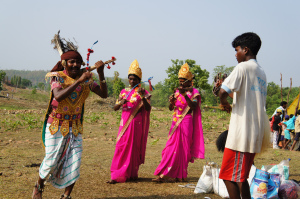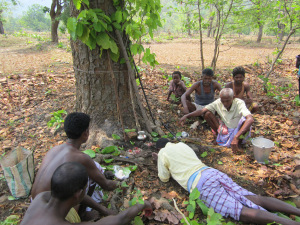On similarities and differences in cultural perceptions of the environment
This week, The Religion Factor holds a theme week on Religion and Climate Change, to pay attention to the 18th conference of the parties to the UN Framework Convention on Climate Change in Doha, Qatar. Today’s contribution is by Lea Schulte-Droesch.
A long time ago, in the true age
There were many vines in the forest
A breeze brought rain from the sky in the right time
We made a long way short (we built roads)
After clearing the jungle we built cities and markets
When the forest was gone, the rain stopped
The people have increased and the country has become crowded
We used to eat a bowl of rice, now we are sharing only a fist full
Even two real brothers do not get along
Daily they fight
(Song sung by Santal men during an annual hunting ritual in rural Eastern India.)
This week’s UN Climate Change Conference in Doha has led me to reflect upon local perspectives on climate change in an indigenous society in India, where I recently conducted anthropological fieldwork. The area in focus is located in Eastern India, in the state of Jharkhand, and mainly inhabited by an indigenous group called the Santal. They form one of the largest groups (ca. 6.5 million) within the indigenous population of India.

The above song was composed by local men and performed at different hunting festivals during the hot season in May and June. The context of the hunting ritual and the content of the song offer valuable insights into how, especially in the rural parts of the Santal areas, people view their relation to the environment.
In rituals I observed and narratives and songs I collected the role of humans is portrayed in symbiosis with local mountain gods, animals and the environment. For example, during one hunting ritual men offered chickens to the forest and mountain gods so that they would send rain (see picture below). The rain is necessary for the people to plough the earth and sow rice, their main staple. By sending rain, the gods also in a way protect the wild animals, as the bad weather forces the hunters to return to the villages. In this holistic worldview, humans are part of a system, in which they have to serve the gods and not go against their rules, but they are not necessarily stewards of the earth and the ones who protect it. Fulfilling their role in the yearly worship of the mountain and forest gods is not easily recognized as a concern or even protection of the environment from the viewpoint of, let’s say, European societies.

The song is thus to be understood in the context of this different perception of the human-environment relation, but it also shows some parallel insights to the ones we might have gained in our society. It is a small-scale observation of what is being addressed on a much more global scale in Doha this week, but embedded in a specifically local worldview. It is further a perceptive observation on the relation between the decline of forest and climate change, a very logical observation in the Santal worldview as well, where the gods who bring rain are located in the forest. “The true age” refers to a mystical time when humans and gods were very close, often depicted as an ideal world. The song clearly recognizes the human responsibility for environmental and the ensuing social degradation, but it does not offer a solution. What kind of action therefore results from this realization of environmental change is dependent on the cultural context. It is part of the way in which people understand the world and their place within it, an insight that might help understand in general how humans see their actions as impacting the environment or not.
For the future it might prove fruitful to examine how compatible different views on the environment are and what we can learn from each other, in the hope that we and many societies different from ours discover common ground for action.
Lea Schulte-Droesch is a PhD student at the Faculty of Theology and Religious Studies researching Santal rituals with regard to conceptions of territory and the environment.

